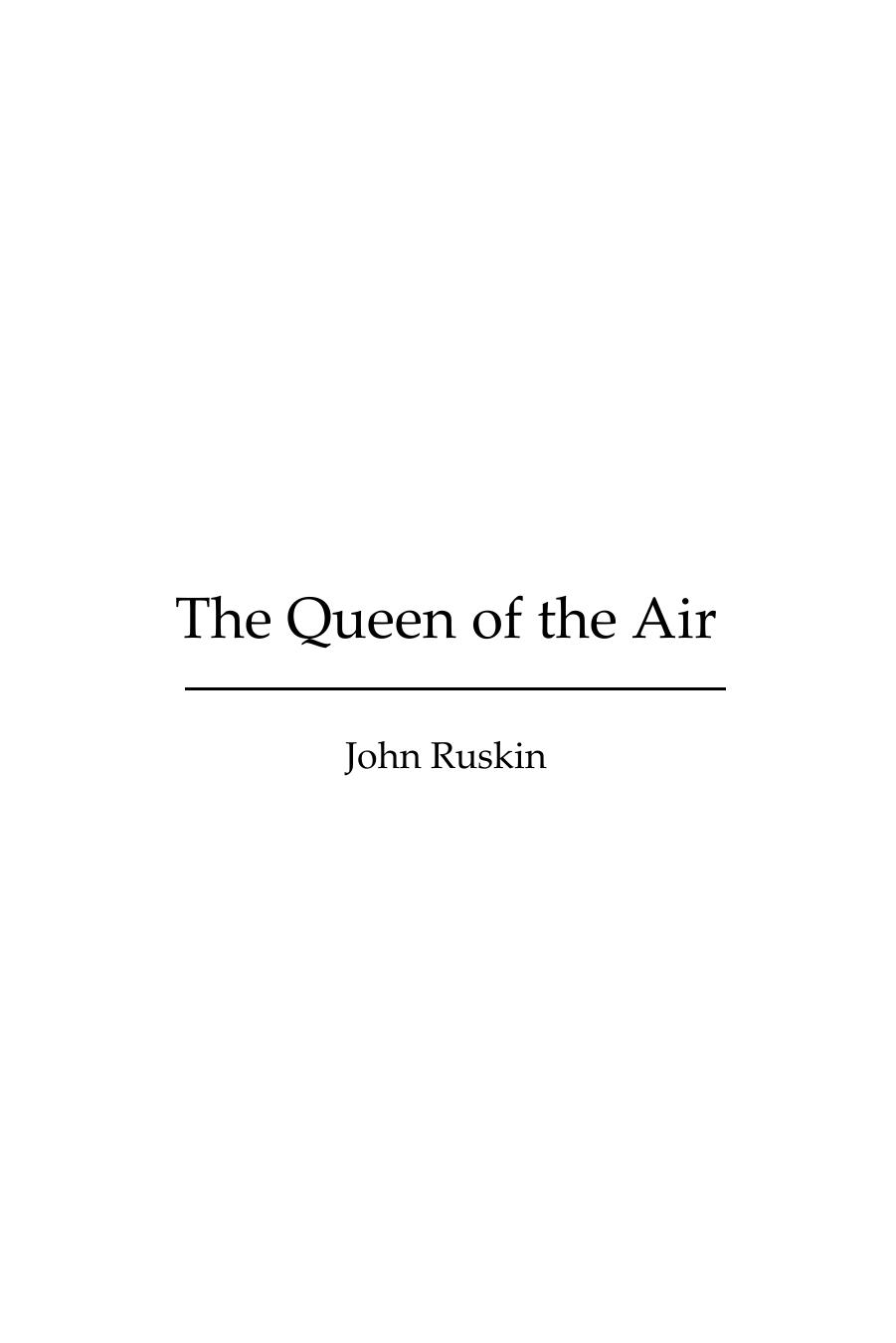The Queen of the Air by John Ruskin

Author:John Ruskin
Language: eng
Format: epub, pdf
Tags: ancient greek, greece, greeks, myth, myths, mythology, legend, legends, athena, gods
ISBN: 9781781667132
Publisher: Andrews UK Limited 2012
Published: 2012-06-18T00:00:00+00:00
III.
ATHENA ERGANE.*
(Athena in the Heart.)
* "Athena the worker, or having rule over work." The name was first give to her by the Athenians.
VARIOUS NOTES RELATING TO THE CONCEPTION OF ATHENA AS THE DIRECTRESS OF THE IMAGINATION AND WILL.
101. I have now only a few words to say, bearing on what seems to me present need, respecting the third function of Athena, conceived as the directress of human passion, resolution, and labor.
Few words, for I am not yet prepared to give accurate distinction between the intellectual rule of Athena and that of the Muses; but, broadly, the Muses, with their king, preside over meditative, historical, and poetic arts, whose end is the discovery of light or truth, and the creation of beauty; but Athena rules over moral passion, and practically useful art. She does not make men learned, but prudent and subtle; she does not teach them to make their work beautiful, but to make it right.
In different places of my writings, and though many years of endeavor to define the laws of art, I have insisted on this rightness in work, and on its connection with virtue of character, in so many partial ways, that the impression left on the reader's mind - if, indeed, it was ever impressed at all - has been confused and uncertain. In beginning the series of my corrected works, I wish this principle (in my own mind the foundation of every other) to be made plain, if nothing else is; and will try, therefore, to make it so, as far as, by any effort, I can put it into unmistakable words. And, at first, here is a very simple statement of it, given lately in a lecture on the Architecture of the Valley of the Somme, which will be better read in this place than in its incidental connection with my account of the porches of Abbeville.
102. I had used, in a preceding part of the lecture, the expression, "by what faults" this Gothic architecture fell. We continually speak thus of works of art. We talk of their faults and merits, as of virtues and vices. What do we mean by talking of the faults of a picture, or the merits of a piece of stone?
The faults of a work of art are the faults of its workman, and its virtues his virtues.
Great art is the expression of the mind of a great man, and mean art, that of the want of mind of a weak man. A foolish person builds foolishly, and a wise one, sensibly; a virtuous one, beautifully; and a vicious one, basely. If stone work is well put together, it means that a thoughtful man planned it, and a careful man cut it, and an honest man cemented it. If it has too much ornament, it means that its carver was too greedy of pleasure; if too little, that he was rude, or insensitive, or stupid, and the like. So that when once you have learned how to spell these
Download
This site does not store any files on its server. We only index and link to content provided by other sites. Please contact the content providers to delete copyright contents if any and email us, we'll remove relevant links or contents immediately.
The remains of the day by Kazuo Ishiguro(8999)
Tools of Titans by Timothy Ferriss(8395)
Giovanni's Room by James Baldwin(7346)
The Black Swan by Nassim Nicholas Taleb(7129)
Inner Engineering: A Yogi's Guide to Joy by Sadhguru(6794)
The Way of Zen by Alan W. Watts(6614)
The Power of Now: A Guide to Spiritual Enlightenment by Eckhart Tolle(5781)
Asking the Right Questions: A Guide to Critical Thinking by M. Neil Browne & Stuart M. Keeley(5775)
The Six Wives Of Henry VIII (WOMEN IN HISTORY) by Fraser Antonia(5515)
Astrophysics for People in a Hurry by Neil DeGrasse Tyson(5189)
Housekeeping by Marilynne Robinson(4447)
12 Rules for Life by Jordan B. Peterson(4304)
Ikigai by Héctor García & Francesc Miralles(4274)
Double Down (Diary of a Wimpy Kid Book 11) by Jeff Kinney(4272)
The Ethical Slut by Janet W. Hardy(4251)
Skin in the Game by Nassim Nicholas Taleb(4248)
The Art of Happiness by The Dalai Lama(4130)
Skin in the Game: Hidden Asymmetries in Daily Life by Nassim Nicholas Taleb(4006)
Walking by Henry David Thoreau(3962)
